POWER RANKING: Here's who has the best chance of becoming the 2020 Democratic presidential nominee
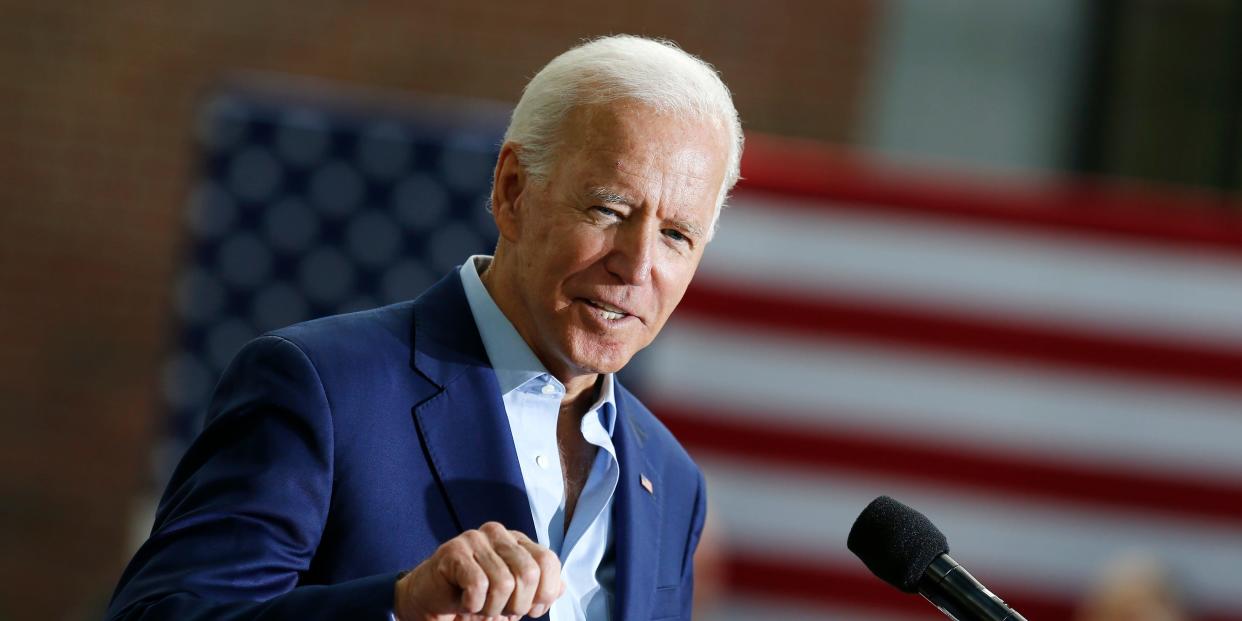
Associated Press
With 15 major candidates, the Democratic 2020 presidential field is one of the largest, most competitive, and most unpredictable in modern history.
We've combined Insider's polling and results of Morning Consult's daily survey of the 2020 Democratic primary to create a power ranking of 2020 candidates.
In the past few weeks, both former Gov. Steve Bullock and Sen. Kamala Harris dropped out of the race, shaking up the field with just two months to go until the Iowa caucuses.
This week, we upgraded Sen. Michael Bloomberg, and Sen. Bernie Sanders but downgraded Mayor Pete Buttigieg and Sen. Cory Booker.
Here's what our power ranking looks like as of December 13, 2019.
With 15 major candidates in the race, the Democratic 2020 presidential field is set to be one of the largest, most competitive, and most unpredictable in modern history.
To help make sense of where all these candidates stand, Insider has been conducting a recurring SurveyMonkey Audience national poll. You can download every poll here, down to the individual respondent data.
Read more about how the Insider 2020 Democratic primary tracker works.
We're mainly interested in using our polling to figure out:
What percentage of Democratic voters are familiar with each candidate in the first place.
How Democrats rate each candidate's chances of beating President Donald Trump in the general election.
If a given candidate were to drop out of the race, who that candidate's supporters would flock to next.
We've combined Insider's polling and results of Morning Consult's daily survey of the 2020 Democratic primary to create a power ranking of declared and potential 2020 candidates.
This week, we upgraded Sen. Michael Bloomberg, and Sen. Bernie Sanders but downgraded Mayor Pete Buttigieg and Sen. Cory Booker.
In the past two weeks, both former Gov. Steve Bullock and Sen. Kamala Harris dropped out of the race, shaking up the field with just two months to go until the Iowa caucuses.
Here's what our ranking looks like as of December 13, 2019.
15: Former Gov. Deval Patrick of Massachusetts
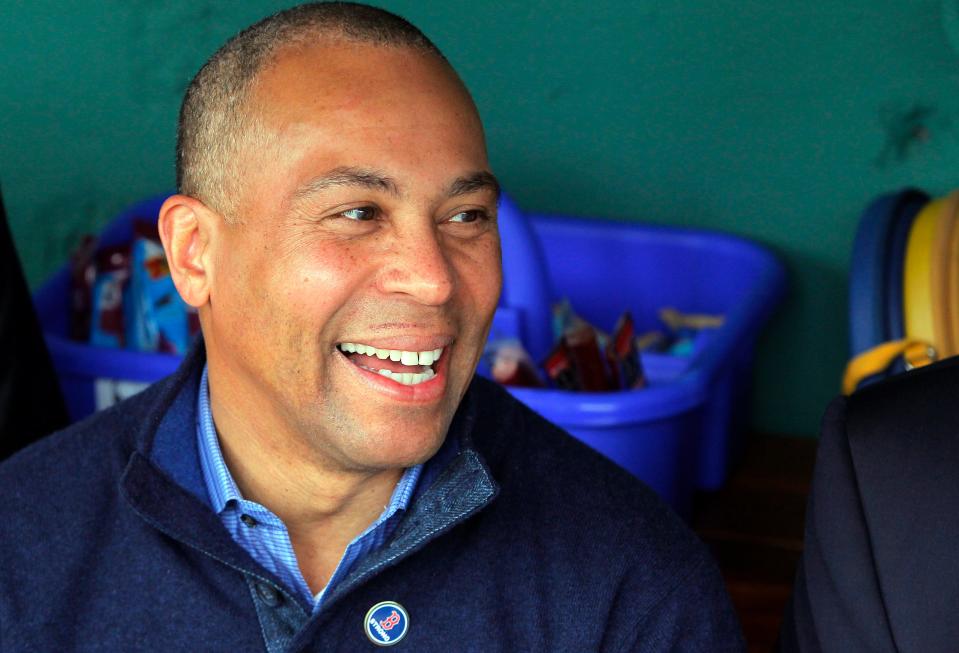
Reuters
Like Bloomberg, Patrick also made an extremely late entry into the race, officially announcing his campaign on November 14.
While Patrick hasn't been very active on the political scene for the past few years, he's led a long career in business and politics. He served as the governor of Massachusetts from 2007 to 2015, and was most recently a managing director at Bain Capital, the private equity firm founded by Sen. Mitt Romney.
Patrick will have a tough uphill battle in his presidential bid, and it's almost impossible to see a clear path to him winning any primary contests at all, much less a path to the nomination, which is why we put him in 13th place near the bottom of our ranking.
He's already missed the filing deadline for two key Super Tuesday state primaries in Alabama and Arkansas, and unlike Bloomberg, he doesn't have billions of dollars in personal wealth to draw from.
More importantly, Patrick doesn't seem to have a clear rationale for running for president other than trying to position himself as a unifying Obama-type figure — the exact lane Biden is occupying, situating him in last place in our ranking.
—Annie Grayer (@AnnieGrayerCNN) November 21, 2019
Read more about Deval Patrick's campaign.
14: Former Rep. John Delaney of Maryland
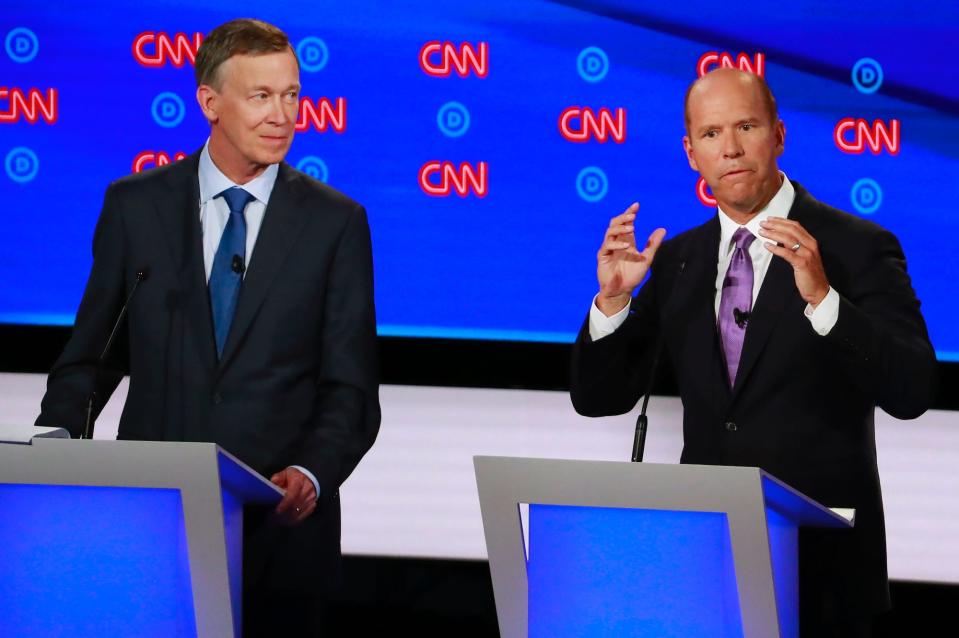
Lucas Jackson/Reuters
Delaney is among those at 1% in Morning Consult polls. According to Insider's polling, he's known by about 20% of Democrats, but he has been unable to build a base of support having to compete with former VP Joe Biden for moderate voters.
We moved Delaney to the bottom of our ranking in early August he was thoroughly walloped by Sen. Elizabeth Warren in the July Democratic debates.
Warren had the line of the night in criticizing him, saying, "I don't understand why anybody goes to all the trouble of running for president of the United States just to talk about what we really can't do and shouldn't fight for."
Now that he hasn't qualified for the fall debates and is on the outside looking in, the rationale for him staying in the race is less and less clear.
Read more about John Delaney's campaign.
13: Sen. Michael Bennet of Colorado
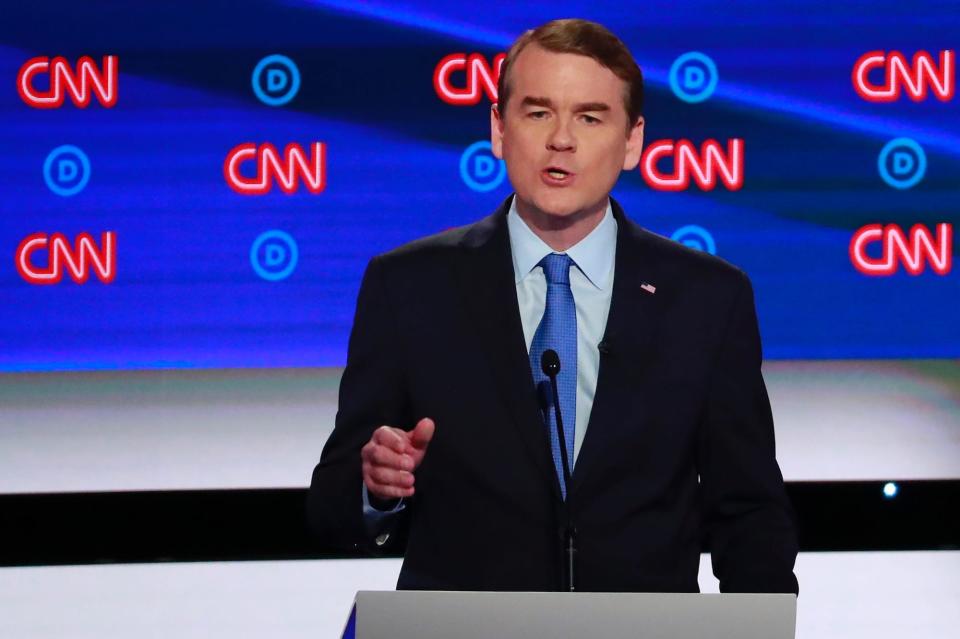
Lucas Jackson/Reuters
Despite being a relatively savvy politician, Bennet — who has been in the US Senate for 10 years — has the distinction of being both the least recognized and worst-polling person with any political experience in the 2020 field.
Bennet is at 1% in Morning Consult's polling, and his would-be constituency has not materialized.
Bennet moved up two spots from 16th to 14th place in late August thanks to his fellow Rocky Mountain and West Coast-based rivals John Hickenlooper and Jay Inslee dropping out of the race, but his practically non-existent fundraising and lack of debate qualification places him at the back of the pack.
Read more about Michael Bennet's campaign.
12: Marianne Williamson
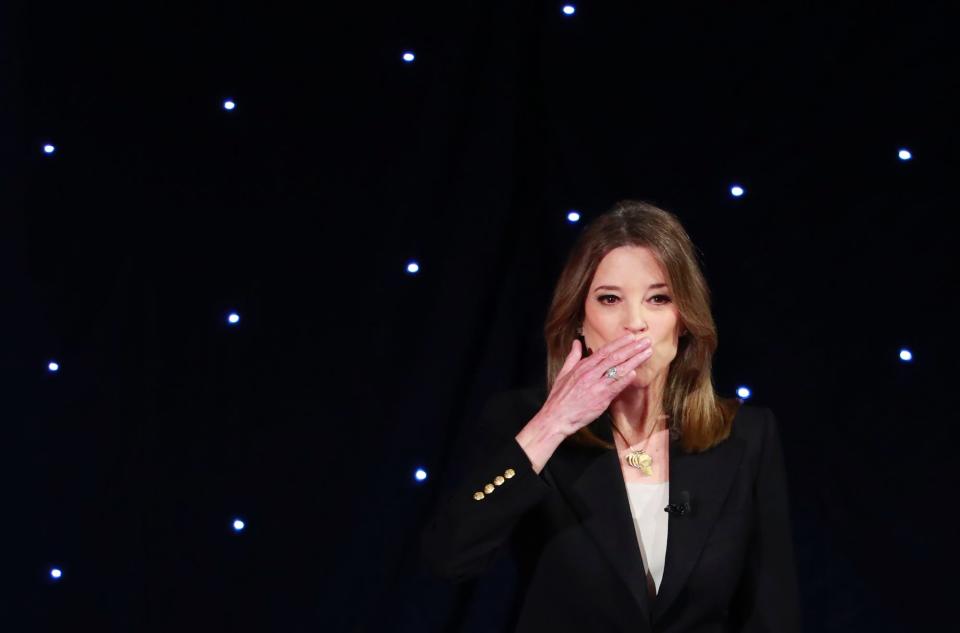
Lucas Jackson/Reuters
Despite having one of the longest-running campaigns, Williamson, a motivational speaker and New Age spiritual guru, has not been capable of consolidating support or name recognition.
Williamson raised $1.5 million in 2019's first quarter and earned the 65,000 individual donors required to make the first Democratic debates.
Despite her low name recognition and lack of political experience, Williamson debated in both the June and July Democratic debates and made a huge splash — making her an online sensation and the subject of countless jokes and memes.
But that online enthusiasm hasn't translated much into the real world. While Williamson has gotten lots of publicity, she hasn't cracked 1% in Morning Consult all year, and her chances of qualifying for any future Democratic debates are next to nothing.
Read more about Marianne Williamson's campaign.
11: Rep. Tulsi Gabbard of Hawaii
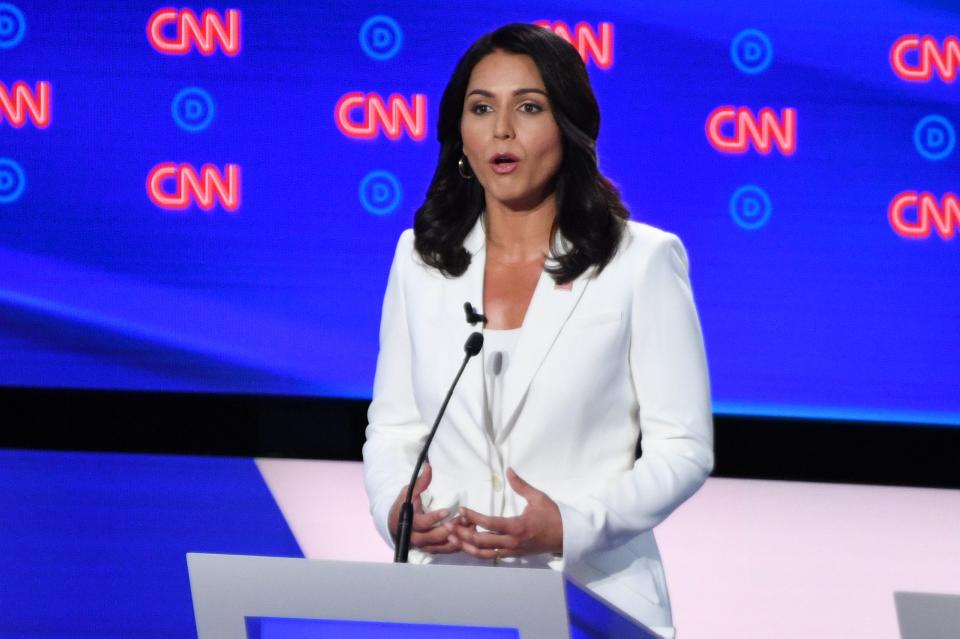
JIM WATSON/AFP/Getty Images
Gabbard has some serious viability problems among Democrats.
Not only do a significant proportion of respondents in Insider polling say they are unhappy with her as the nominee compared with her rivals, but Gabbard has not been able to consolidate support in a meaningful way.
Despite being one of the first to enter the race, Gabbard is still polling at 1% in Morning Consult and is considered a less viable opponent to President Donald Trump in the general election than most other candidates.
But we gave Gabbard another boost on November 1, moving her up two spots from 12th to 10th place following her very public and nasty feud with 2016 Democratic nominee Hillary Clinton, who Gabbrard called "the embodiment of corruption" and the "personification of the rot that has sickened the Democratic Party."
The bump in media attention clearly worked in Gabbard's favor when it comes to polling. She's fully qualified for the fifth Democratic debate on November 20, and has three out of the necessary four qualifying polls for the December debate.
We dropped Gabbard down a spot, however, on November 22 after she spent most of her time at the November Democratic debate blasting her own party as "not the party that is of, by, and for the people" and "influenced by the foreign policy establishment in Washington represented by Hillary Clinton, as well as getting into spats with Sen. Kamala Harris and Mayor Pete Buttigieg.
While Gabbard's performance earned her lots of praise from right-wing media and even the Trump campaign, its exceedingly difficult to see how it helps her win over Democratic primary voters.
Read more about Tulsi Gabbard's campaign.
10: Former Secretary of Housing and Urban Development Julián Castro
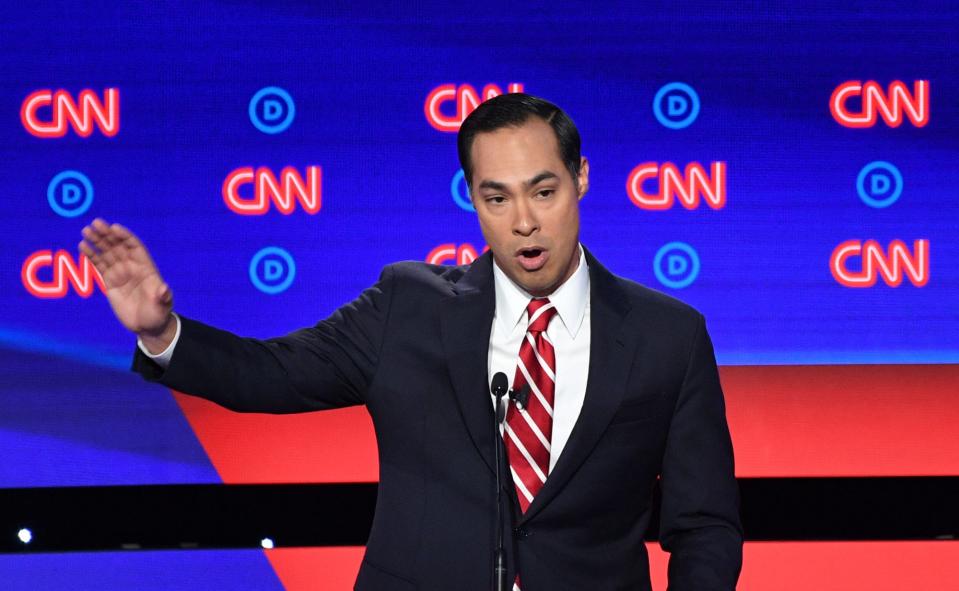
Jim Waton/AFP/Getty Images
Castro became a breakout candidate in June when he distinguished himself as an authority on immigration and proved himself to be a smart and savvy debater.
About 40% of Democratic primary voters are aware of him, and about a quarter would be satisfied with him as the nominee.
However, many of Castro's supporters would be satisfied with other candidates, according to Insider polling.
Castro took advantage of the first Democratic primary debates to establish himself as an expert on the issue of immigration, putting the pressure on fellow candidates to support decriminalizing unauthorized border crossings.
But now that he's failed to qualify for the November or December Democratic primary debates and has much less cash on hand than his rivals, his time left in the race could be limited, situating him in 10tth place.
Read more about Julian Castro's campaign.
9: Tom Steyer
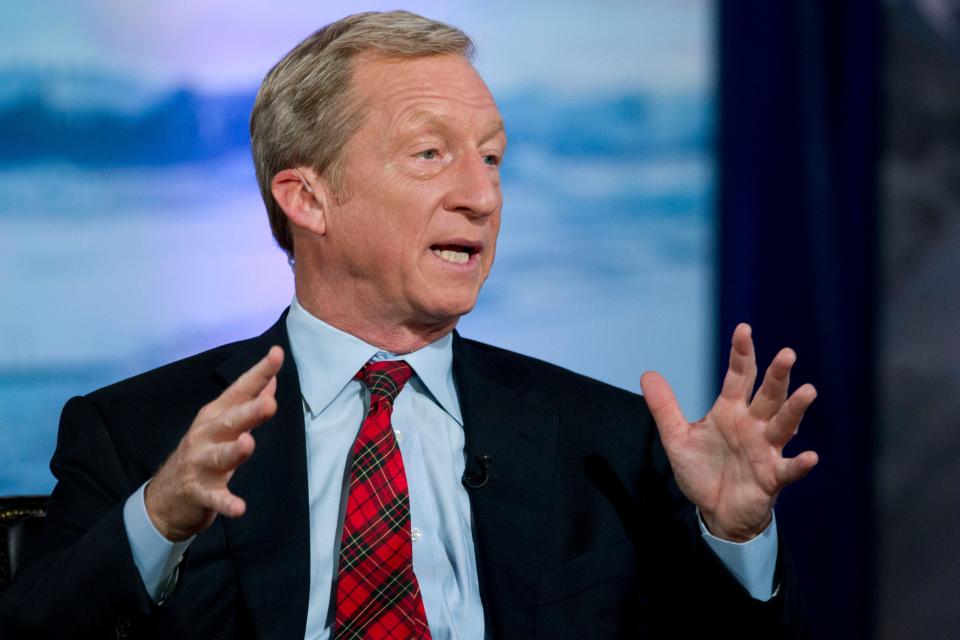
Associated Press
Steyer achieved billionaire status as an investor and hedge fund manager — but he has since focused his efforts on advancing Democratic causes with two organizations, Need To Impeach and NextGen America.
He entered the race late, on July 9, and has pledged to spend $100 million of his own money on his presidential race. For context, the highest-fundraising candidate of 2019's second quarter — Mayor Pete Buttigieg of South Bend, Indiana — raised $24.8 million.
In determining where to place Steyer in our ranking, we wondered: "Which candidates are worth more than Tom Steyer and $100 million?"
Given the TV ads and campaign infrastructure that money can buy, we placed him ahead of several of the lowest-polling and lowest-fundraising candidates, but we're still not sure that $100 million can buy him more support and better polling numbers than the ones above him.
We bumped Steyer up one spot on October 25 for qualifying for the fifth Democratic debate in November and moved him up another two spots on November 1 due to his strong polling, tied for 4th place at 9% in early primary states in Morning Consult.
But after spending close to $50 million of his own money on his presidential campaign, Steyer still has largely failed to articulate a clear rationale for his candidacy just a few months before the first primary contests, putting forth a rather lackluster performance at the November debate.
Read more about Tom Steyer's campaign.
8: Sen. Cory Booker of New Jersey
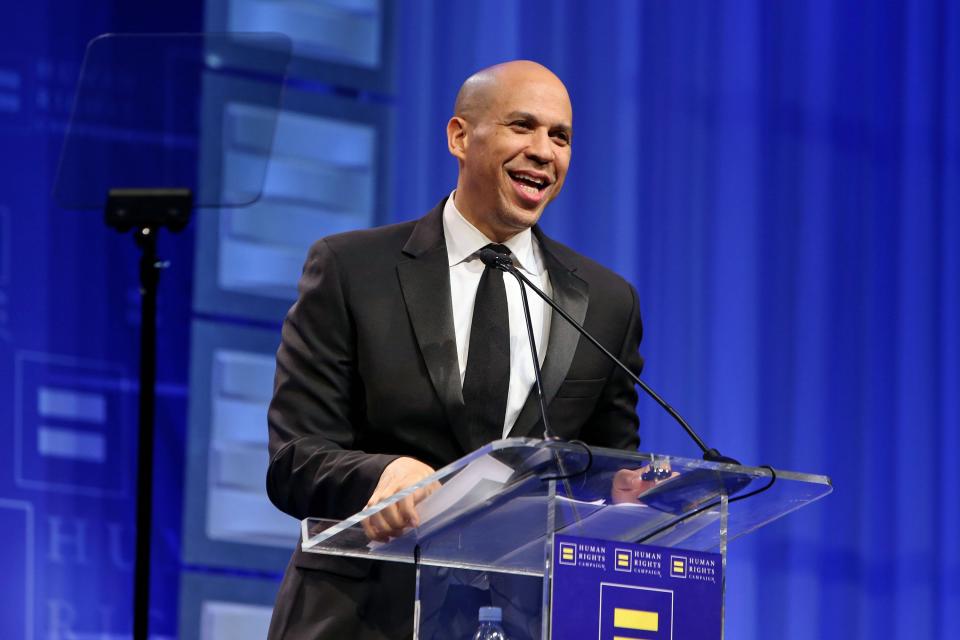
Randy Shropshire/Getty Images for The Human Rights Campaign
Booker is known by half of likely Democratic primary voters, but he has not been able to translate that into good polling numbers, staying stagnant at 2% to 4% of the vote for the duration of 2019 in Morning Consult surveys.
His support is precarious in the sense that people who like Booker also like lots of other candidates.
Seventy percent of Booker supporters would be happy with Biden, 76% would be satisfied with Harris, and 74% would be satisfied Warren as the nominee, according to Insider polling.
We dropped Booker down four spots to 8th place after his campaign released a memo on September 21 warning that Booker's campaign might no longer be viable if he doesn't raise another $1.7 million by the end of quarter deadline on September 30.
We bumped Booker up a spot in our ranking on November 22 after his resoundingly strong performance at the November 20 Democratic debate, but moved him back down again after he failed to translate his strong debate into sustainable momentum for his campaign.
Booker failed to earn any qualifying polls for the December 19 Democratic debate, leaving him on the outside looking in.
Read more about Cory Booker's campaign.
7: Sen. Amy Klobuchar of Minnesota
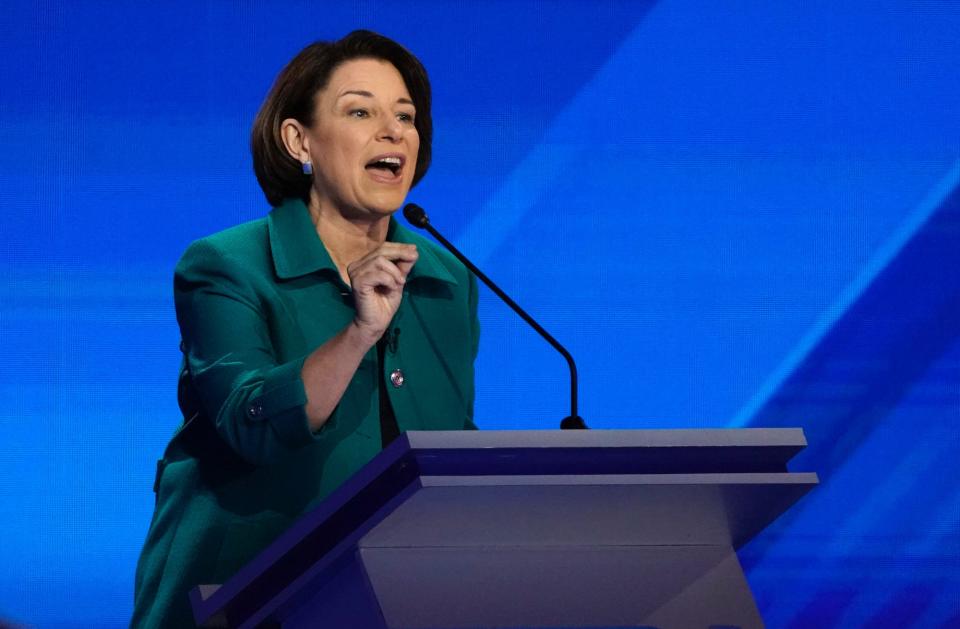
Mike Blake/Reutrers
Klobuchar is relatively well-known, but she's still largely overshadowed by her other Senate colleagues with higher name recognition, polling at 2% in Morning Consult.
While Klobuchar famously launched her campaign in a snowstorm, her campaign has failed to gain much traction in light of Biden dominating the centrist lane.
We dropped Klobuchar down to 12th place on the week of October 11 due to her now polling at just 1% in early primary states in Morning Consult — a very ominous sign for a candidate whose entire strategy revolves around winning in Iowa and New Hampshire.
But we bumped her up three spots to 9th place on October 18 after her strong debate performance. Klobuchar successfully revitalized her campaign by landing strategic punches on other candidates, making the case for her pragmatic agenda, and raising over $1 million the day after.
We bumped Klobuchar up another spot up to 7th place on December 13 for qualifying for the sixth Democratic debate on December 19, showing she still has some momentum.
Read more about Amy Klobuchar's campaign.
6: Andrew Yang
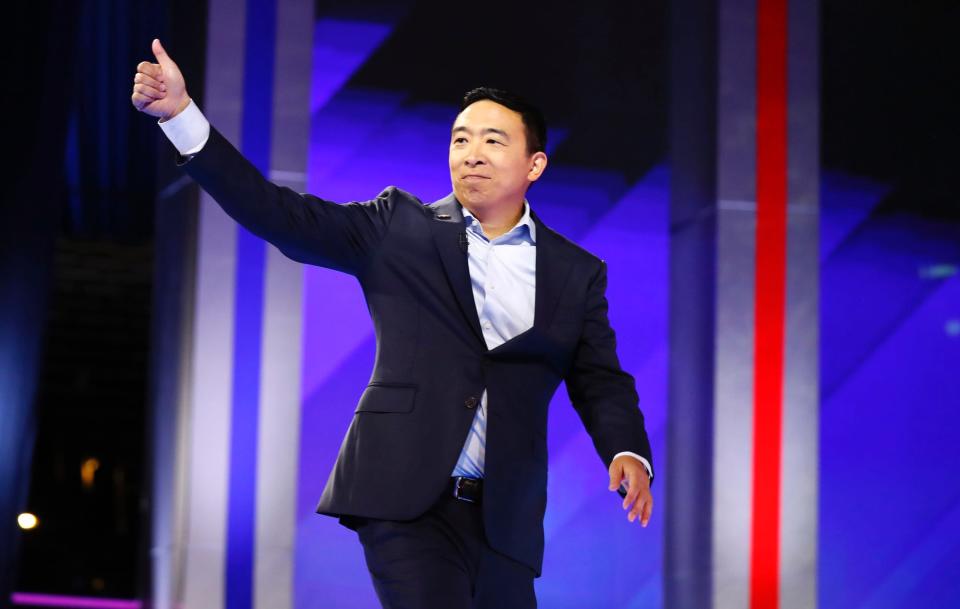
Jonathan Bachman/Reutrers
Yang, despite the low name recognition that accompanies running for president without political experience, is actually doing fairly well in Insider polling.
He isn't a favorite by any measure, polling at 4% in Morning Consult, but his online army of supporters and meme creators, known as the Yang Gang, have helped him sustain the buzz around his campaign for months despite his lack of political experience.
He's steadily rising in the polls, built a grassroots network of over 200,000 unique donors, and hasn't let Biden's presence into the race undermine his appeal and policy ideas.
Yang not only did well in the September debate and qualified for the next round of Democratic primary debates in October, but has been able to successfully play the media and outpace many of his rivals.
We bumped Yang up a spot to fifth place in October because of his outstanding third-quarter fundraising haul in which he brought in $10 million, and his proven ability to run a unique, energetic, and attention-grabbing campaign.
Read more about Andrew Yang's campaign.
5: Mayor Pete Buttigieg of South Bend, Indiana
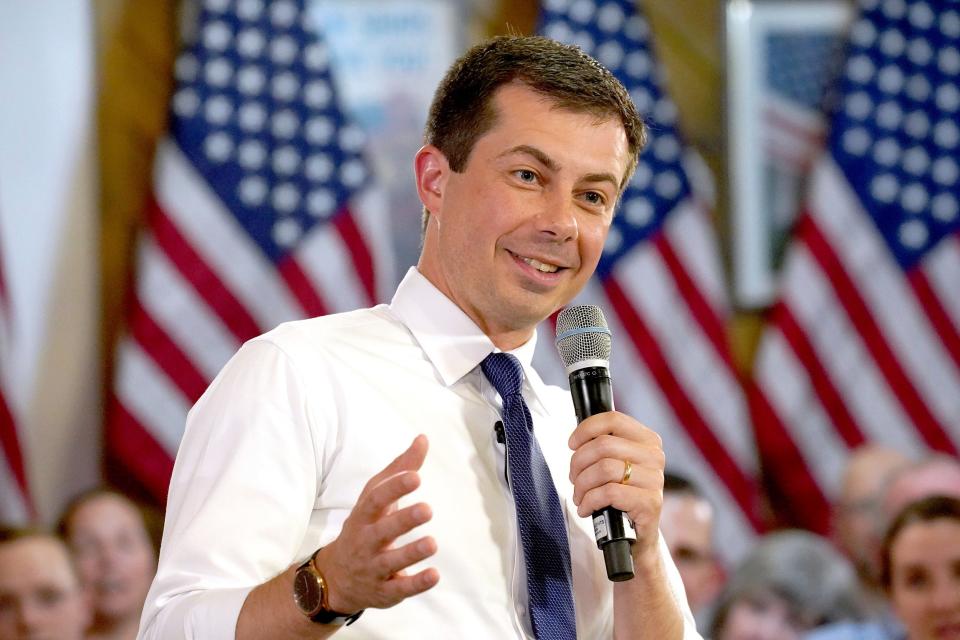
Associated Press
Despite relatively low name recognition, he's enjoyed a strong past few months in the polls and in fundraising.
The Democratic primary voters who do know him are fairly confident in his ability to beat Trump, compared with his more experienced and nationally known rivals, Insider polling has found.
Buttigieg has enjoyed a considerable polling bump. In late April, Morning Consult had him ranked third behind Biden and Sanders at 8%, up from 0% in late February and 1% in March. He's now at 9% in fourth place.
While Buttigieg's numbers have slightly dipped in Morning Consult's polling, his sustained strong performance in polling and fundraising shows both that he's not a flavor-of-the-month candidate and that he has lots of room to grow.
On November 15, we moved Buttigieg up another spot to third place due to him successfully positioning himself as the heir to Biden's dominance over the moderate lane.
A recent CNN/Des Moines Register poll conducted by Ann Selzer — one of the nation's best and most highly-respected pollsters — found Buttigieg with 25% support in Iowa, a huge lead ahead of Warren at 16% and Sanders and Biden at 15%.
He's also making gains in New Hampshire, the second state to vote. And while Buttigieg went into the fifth Democratic primary debate with a huge target on his back due to his strong polling, he emerged relatively unscathed and wasn't attacked during the actual debate.
Despite his overall strong position in the race, we knocked him down to fifth place on December 13 due to him bogging his campaign down in nasty feuds with progressives over everything from free college to Warren's previous legal work.
As a result of his feud with Warren, Buttigieg had to disclose his consulting work and defend himself against speculation that he could have contributed to cutting jobs at Blue Cross/Blue Shield of Michigan and even may have played a role in the Canadian bread price-fixing scandal.
And as the classic rule of politics states, if you have to explicitly announce that you had nothing to do with a decade-long scheme to fix the price of bread across Canada, you're not winning the week.
Read more about Pete Buttigieg's campaign.
4: Michael Bloomberg
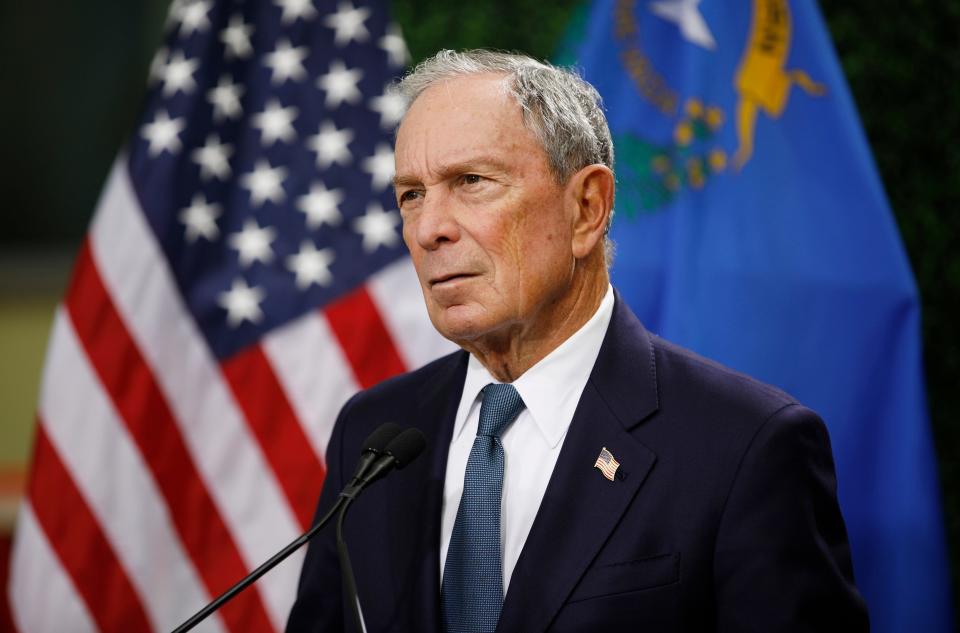
Associated Press
On November 7, The New York Times reported that former New York City Mayor Michael Bloomberg was expected to make a late entrance in the 2020 Democratic primary.
Bloomberg will have to work quickly to get his campaign off the ground, but he has the luxury of being able to self-fund his campaign with his estimated $52 billion net worth.
But there's a big catch: Bloomberg has announced he's sitting out the first four primary contests altogether, and will try to rack up victories in Super Tuesday states.
Despite being in the race for a relatively short amount of time, Bloomberg has made a pretty sizeable impact, leading us to bump him up two spots on December 6. So far, he's spent a mind-bogglingly large sum of at least $100 million on TV ads, dwarfing his fellow candidates by tens of millions of dollars.
If you've watched TV or YouTube recently, you've probably seen at least one of his ads, and his strategy is paying off, rocketing him into the top tier of candidates and earning him a promotion from sixth to fourth place in our ranking due to the sheer amount of money he's pumped into the race.
Bloomberg has shot up to fifth place in Morning Consult at 6% and has an average of 5.5% in Real Clear Politics.
Read more about Michael Bloomberg's campaign.
3: Sen. Bernie Sanders of Vermont
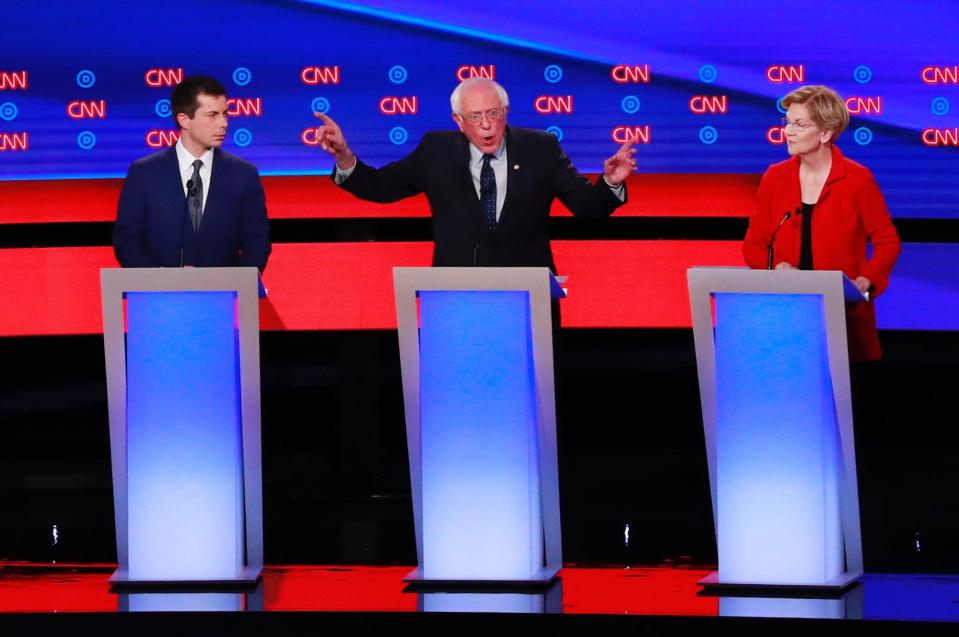
Lucas Jackson/Reuters
Sanders enjoys widespread name recognition among Democrats from his decades serving in Congress and his 2016 run against Hillary Clinton. He's also established a grassroots army of small donors that helped him lead the pack in fundraising with an $18.2 million haul in 2019's first and second quarters.
He is considered the top rival of Biden, and 49% think Sanders would beat Trump in a general election compared with 29% who think he'd lose, according to Insider polling.
Furthermore, Insider polling found that Sanders would be a satisfactory nominee for half of Biden supporters, which could seriously benefit him in case Biden's candidacy falters.
Sanders is supported by 22% of Democrats, according to Morning Consult, down four percentage points from April and in second place.
Sanders raised a monster sum of $25 million in the third fundraising quarter of 2019, outpacing all his fellow candidates. Even more impressive, Sanders doesn't do private, closed-door fundraising, relying on 100% grassroots donations.
We moved Sanders up from fourth to third after he had a number of encouraging polls in early states and nationwide, surpassing Warren to second place in both Morning Consult and Real Clear Politics' polling average.
Sanders earning some key endorsements, rising in the polls, and staying out of the fray of the other candidates feuding could make him an unlikely favorite going into the Iowa and New Hampshire primaries.
Read more about Bernie Sanders' campaign.
2: Sen. Elizabeth Warren of Massachusetts
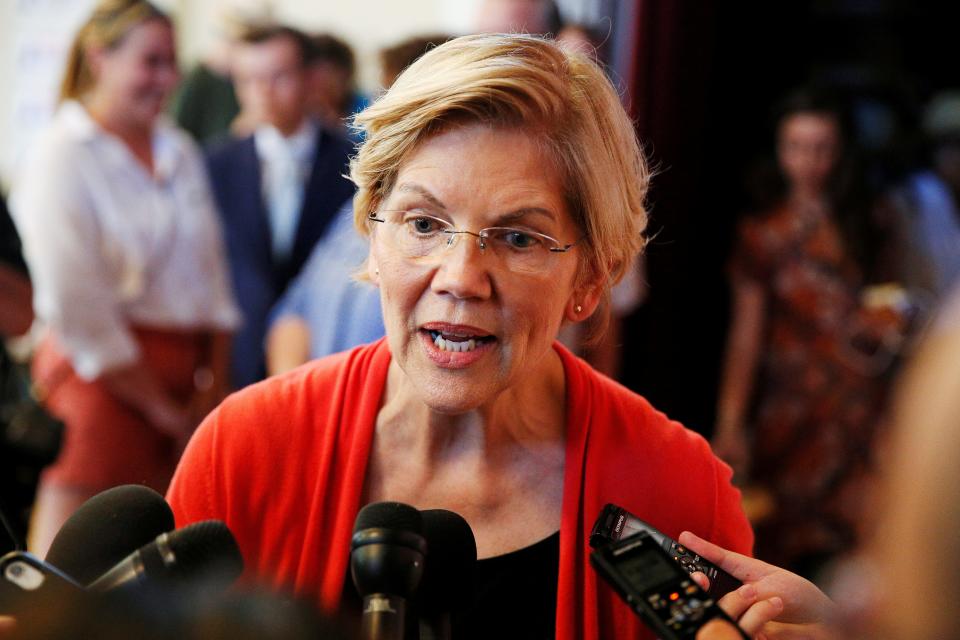
Reuters
Warren is the best-known candidate who has not previously run for president, and has proven herself to be a top-tier candidate.
She overlaps considerably with Sanders and Biden's bases, with 50% of Biden supporters and 57% of Sanders supporters also being satisfied with her as the nominee in Insider polling.
Not only does Warren have high name recognition, but Insider polling respondents see her as the second most electable candidate behind Biden.
Warren is in third place at 15% in Morning Consult polling, and her favorability ratings and perceived electability numbers are remaining strong over time.
Despite Warren's slight dip in the polls after her surging across multiple polls in support, favorability, enthusiasm, and perceived electability over the summer, we bumped Warren up a spot on December 6, since she's poised to significantly benefit from Kamala Harris' exit from the 2020 race.
Read more about Elizabeth Warren's campaign.
1: Former Vice President Joe Biden
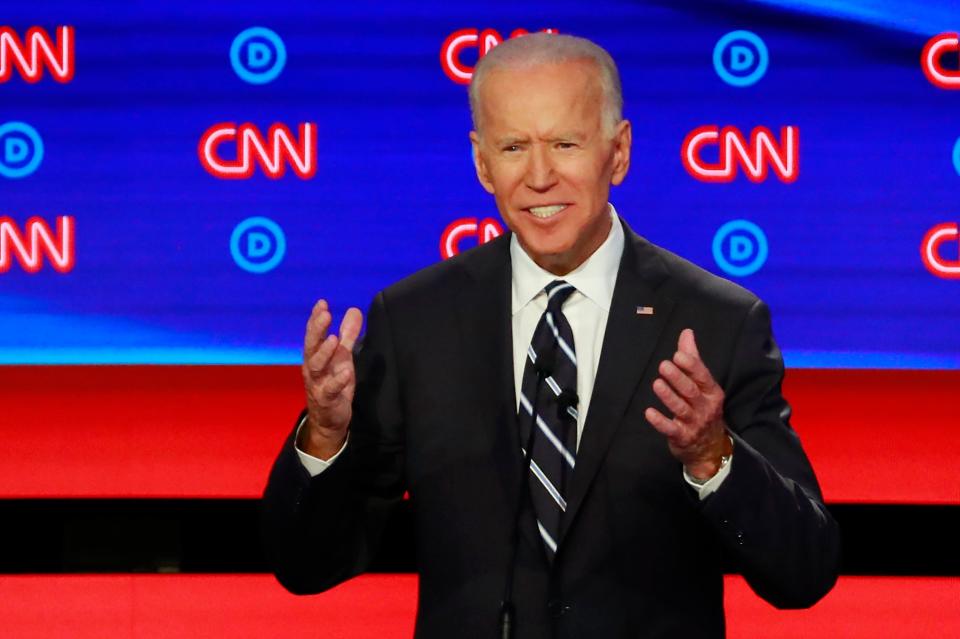
Reuters
Biden has unparalleled name recognition among Democrats from his eight years as President Barack Obama's vice president and 36 years in the US Senate.
Despite taking hits from his rivals at both of the first Democratic primary debates, Biden maintains high levels of support, leading the field with 32% support in Morning Consult and being perceived as most likely to beat Trump in Insider polling and most other polls.
Biden has managed to recover from his setbacks along the way and bounced back in the polls. He ranks first also due to his high levels of support among older and African-American voters— two crucial constituencies in Democratic primaries.
After a couple months where Biden was second to Warren, we moved Biden back up to first place on November 15 due to him regaining his lead in RealClearPolitics' polling average, coming in first place in a Quinnipiac poll of New Hampshire, and being within the margin of error of Warren and Sanders in a Monmouth poll of Iowa, two states where Sanders and Warren should be overperforming.
And most important, the last-minute entrances of former New York City Mayor Michael Bloomberg and former Gov. Deval Patrick of Massachusetts — two other moderates — have failed to make a dent in Biden's lead.
Read more about Joe Biden's campaign.
Read more:
The Bernie Bro is over. Introducing the Yang Bro, the Bloomberg Bro, and the Gabbard Bro.
Read the original article on Insider

